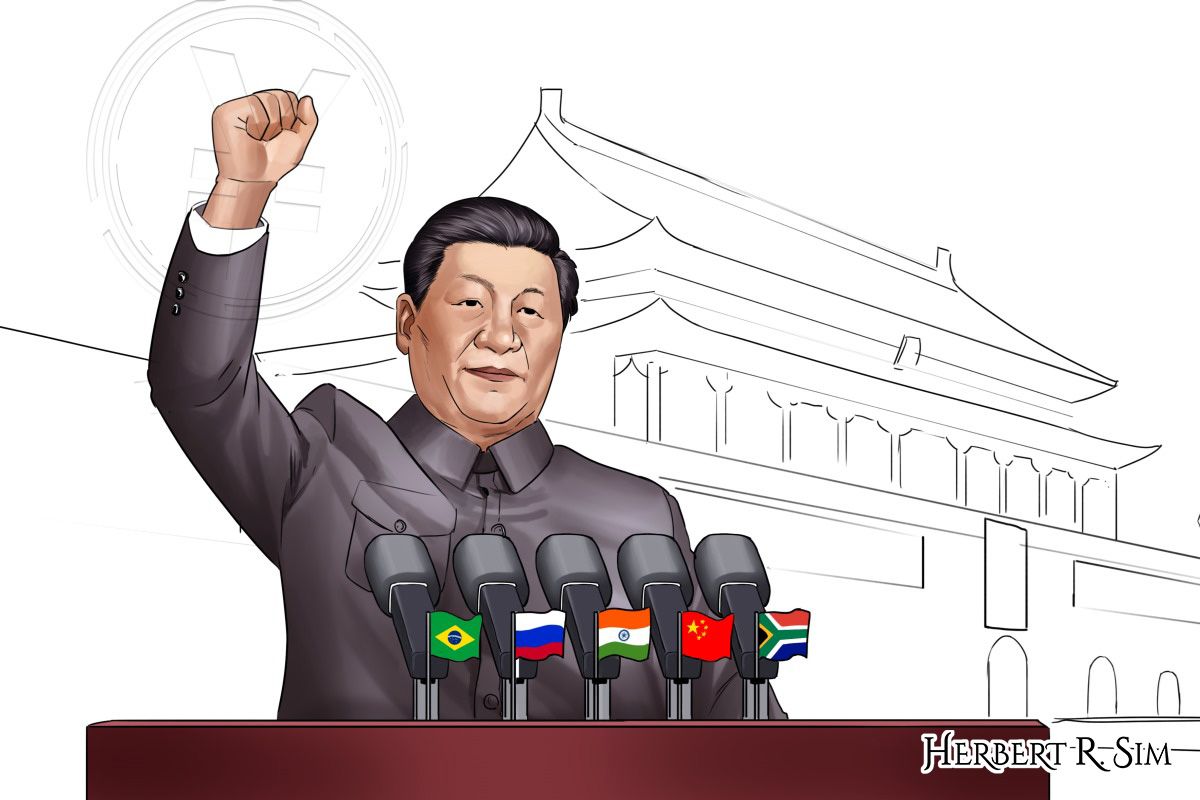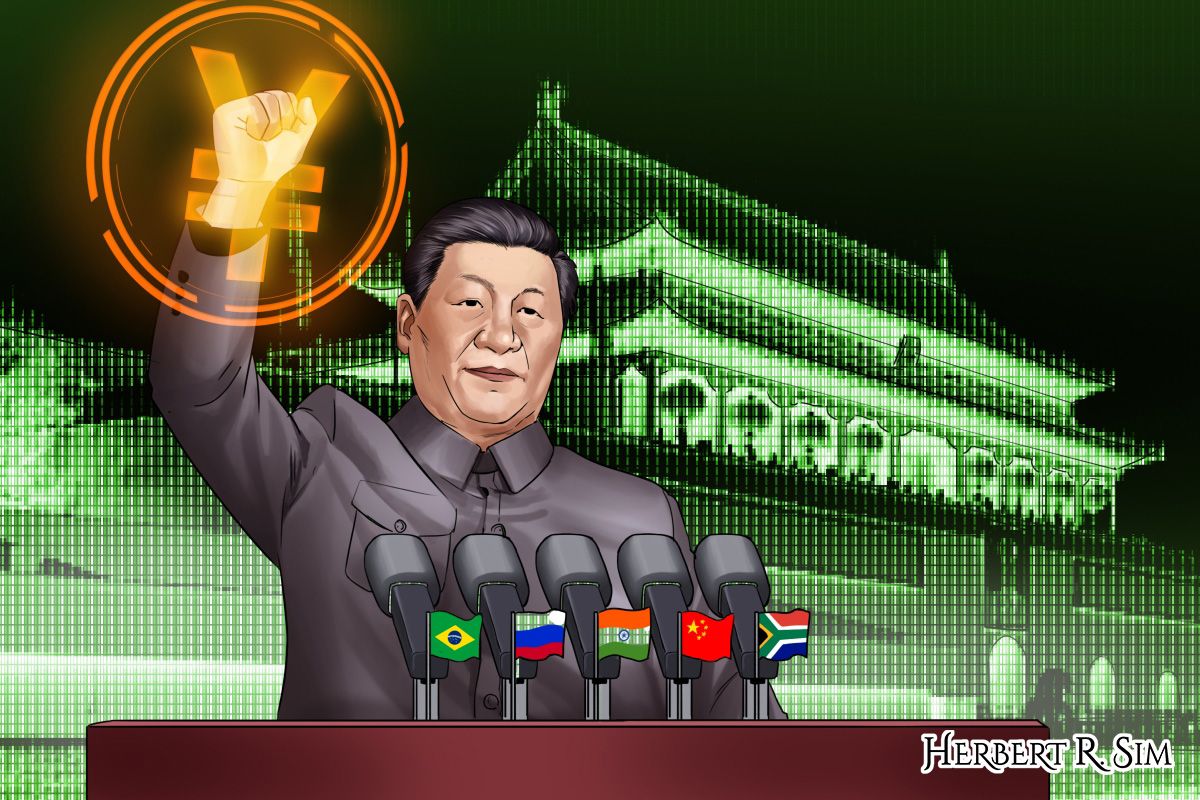
In my latest illustration, it features China’s president Xi Jinping, holding up a fist showcasing ‘Digital Yuan’.
———————————————————
The rise of the BRICS countries (Brazil, Russia, India, China, and South Africa) has led to a fundamental shift in the global economic landscape, posing a significant challenge to the long-standing hegemony of the US dollar. As these nations increasingly seek to break free from dollar dominance, the role of cryptocurrencies like Bitcoin has become even more pronounced, with the potential to reshape the balance of power in the global financial system.
In an attempt to reduce their reliance on the US dollar, the BRICS nations have been accumulating gold reserves. This strategy is designed to support their own currencies and potentially create a new global reserve currency. However, as the world moves towards digitalisation, relying on physical gold may soon become not just an outdated concept but also a futile approach.
An irreversible shift of power?
The emergence of Bitcoin and other cryptocurrencies has shifted the global financial landscape, offering alternative stores of value and innovative solutions for cross-border transactions. By adopting Bitcoin or other cryptocurrencies, both the US dollar and the BRICS currencies could leverage the benefits of digital currencies and secure their position in the global economy. This is something that will be explored in the later part of this piece.
The seemingly quiet confidence held by the BRICS countries is also considered to be measured and not without substantial thought – with history backing their ideal thesis. The potential decline of the US dollar’s supremacy, specifically, may well be likened to the fall of the Medici Bank in the 15th century. Once the largest and most respected bank in Europe, the bank ultimately collapsed due to mismanagement and competition from emerging financial powers. Similarly, the US dollar might be facing its own reckoning as new contenders, such as the BRICS currencies, gain ground.
The US dollar has enjoyed its status as the world’s primary reserve currency for decades, but this position is not guaranteed to last forever. As the BRICS countries continue to gain economic power, the US dollar’s dominance is increasingly threatened. While it is unlikely to disappear entirely, its role as the world’s reserve currency could be significantly diminished.
Central banks and diversification
Of course, multiple factors can contribute to a crippling US dollar hegemony, for instance, the role that central banks play as well as the diversification of reserves.
Central banks play a crucial role in the global financial system, and their policies can have a significant impact on currency strength. As the BRICS countries continue to develop their central banking systems and monetary policies, they could further strengthen their currencies and reduce their dependence on the US dollar. The introduction of Central Bank Digital Currencies (CBDCs) in these countries could also contribute to this shift, as they would provide a more efficient and secure means of conducting transactions and managing monetary policy.
Countries around the world are also increasingly diversifying their foreign exchange reserves to protect against economic risks and potential crises. By holding a more diverse portfolio of currencies, including those of the BRICS nations, these countries are indirectly reducing their reliance on the US dollar and contributing to its potential decline.
———————————————————

Detailing in the illustration further with BRICS – the acronym for five leading economies: Brazil, Russia, India, China, and South Africa; with President Xi Jinping leading the charge.
———————————————————
The power of Bitcoin and crypto adoption
The idea of countries stocking up on Bitcoin instead of traditional assets like gold or foreign exchange reserves has gained significant traction in recent years, particularly due to the evolving global economic landscape and the rise of digital currencies.
Bitcoin, often referred to as digital gold, has several unique properties that make it an attractive asset for governments to accumulate, especially when considering the challenges posed by traditional reserve assets.
The limited quantity of Bitcoin is one of the most compelling arguments for governments to stock up on it. With only 21 million Bitcoins ever mined, its scarcity is comparable to that of gold, making it a potentially attractive hedge against inflation and currency depreciation. The value of traditional fiat currencies is under threat as central banks throughout the world continue to generate money and engage in quantitative easing. Countries can defend their wealth and purchasing power in the face of anticipated inflationary pressures by stockpiling Bitcoin.
In addition to its scarcity, Bitcoin’s decentralised nature makes it an attractive asset for countries looking to reduce their reliance on the US dollar and other dominant global currencies. By holding Bitcoin, nations can diversify their reserve assets and protect themselves from the economic and political risks associated with a single dominant currency. This diversification is particularly relevant for the BRICS members, which have been actively seeking to establish a more equitable global financial system.
Another critical issue to consider is the growing acceptability and usage of digital currencies around the world. Demand for digital assets such as Bitcoin is projected to expand as more consumers, businesses, and institutions realise the benefits of cryptocurrencies. Countries can position themselves to gain from this expanding demand and perhaps profit from the growth in the value of their digital assets by amassing Bitcoin today.
Furthermore, by embracing digital currencies, countries can foster innovation in their financial sectors, attract investment from forward-thinking businesses, and develop new industries centered around blockchain technology and digital assets. This can lead to job creation, economic growth, and improved financial inclusion for citizens.
The transparency and security of blockchain technology, which underpins Bitcoin, also make it an attractive asset for governments to hold. Blockchain’s immutable ledger ensures that all transactions are recorded and easily auditable, reducing the likelihood of fraud, corruption, and mismanagement. Moreover, the security of the Bitcoin network, ensured by its global network of miners, protects the value of the digital assets held by governments from cyber threats and hacking attempts.
Despite these benefits, countries must proceed with caution and due diligence when accumulating Bitcoin. Investing in Bitcoin and other cryptocurrencies entails risks such as market volatility, regulatory uncertainty, and technological upheaval. While countries may wish to weigh these risks against the potential benefits of holding Bitcoin as a reserve asset, it is also a call for responsible digital asset management, where comprehensive strategies to reduce manipulation and mismanagement can be developed.
In fact, the case for countries to accumulate Bitcoin as an alternative to traditional reserve assets is growing stronger by the day. The unique properties of Bitcoin, coupled with the shifting global economic landscape and the rise of digital currencies, make it an increasingly attractive asset for governments to consider.
———————————————————

The background is featuring? Yes, you guessed it right. It’s the MATRIX! Digital, metaverse, internet currency.
———————————————————
Consumer and investor confidence
Evidently, the perception of a currency’s strength and stability does play a crucial role in attracting investments and maintaining consumer confidence. By embracing cryptocurrencies and demonstrating a commitment to financial innovation, both the US dollar and the BRICS currencies can boost investor confidence, which in turn may bolster their respective positions in the global financial system.
The development of robust regulatory frameworks and financial infrastructure, as highlighted earlier, is essential for the widespread adoption of cryptocurrencies. By creating clear regulations and fostering a supportive environment for digital currencies, both the US and the BRICS nations can encourage greater adoption of cryptocurrencies and benefit from their potential to enhance financial stability and economic growth.
A battle that could become a win-win
The battle between the BRICS currencies and the US dollar for supremacy is ongoing, with the outcome hinging on their ability to adapt to the ever-evolving world of cryptocurrencies. By embracing digital currencies like Bitcoin, these nations can secure their position in the global financial system and potentially reshape the balance of power. Failure to adapt, however, may result in the decline of their currency’s dominance and a missed opportunity to shape the future of the global economy.
This is an opportunity for countries to enhance their respective positions in the global economy and to also help secure their long-term relevance and competitiveness in an increasingly digital world.
